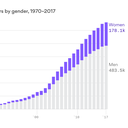A new study predicts computer science won't close its gender gap until 2137

Published Date: 6/24/2019
Source: axios.com
Reproduced from Wang et al., 2019, "Gender Trends in Computer Science Authorship" ; Chart: Axios VisualsFemale researchers, for decades largely boxed out of computer science, have in recent years entered the field in record numbers, but new research suggests the current rate of change is not nearly rapid enough to bring parity to the field within a lifetime.Why it matters: The direction of computer science research is determined by the people who make up the field."Diversity affects the types of problems we choose to work on, the types of datasets we lean on, the types of algorithms we train," says Lucy Lu Wang, the paper's primary author from the Allen Institute for Artificial Intelligence.And the field's longstanding male dominance is self-reinforcing. Among the biggest barriers to women's participation are a lack of peer support, role models and mentorship, says Tess Posner, CEO of the nonprofit AI4ALL.Key stat: A new analysis of 2.9 million computer science papers found that if current trends continue, it would take over a century for the number of male and female authors of computer science papers to be roughly equal.Wang and her co-authors examined a huge trove of papers in Semantic Scholar, a search engine for academic research developed by the Allen Institute.They projected the current trend of growing female authorship into the future, assuming that the ratio of male to female authors will level out — eventually — at around 1-to-1.The red-letter year would be around 2137, according to their research.The researchers also examined how computer scientists collaborate with one another, and found that men are increasingly likely to co-author papers with other men, even as the number of women in the field is growing.This has major implications for progress toward parity, says Wang."If female authors entering the field are having even a slightly harder time finding collaborators who are not women, that's going to be challenge, because right now the total proportion of women is lower than men," she says.What's next: "This shows that we need to intervene far, far earlier in the pipeline than intuitions would suggest," says Jack Clark, policy director at OpenAI. "There's solid evidence that people start dropping out of the pipeline in high school (and sometimes even earlier)."Go deeper: AI is the future of discrimination